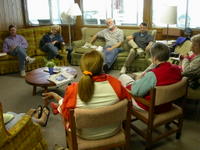
Some years ago a group of us returned for a reunion, and now we continue to gather every few years to renew our commitment to social justice and to search for ways in which secular ethics and spirituality can co-exist in these turbulent times.
This summer we decided to read a book for discussion, and we picked The Sins of Scripture: Exposing the Bible’s Texts of Hate to Reveal the God of Love, written by Episcopal Bishop John Shelby Spong. When it came my turn to pick some text to discuss, this is what I selected:
"Anxious because God could not be reduced to a human formula, the leaders of the church contented themselves with the task of enforcing the faith they could not define. If one disagreed with these ever-more-differing explanations, one was simply evil. The problem was not in the words; it was in the hardened hearts of the heretics whose obstinacy and sinfulness prevented them from believing. The stage was thus set not for unity but for a purge. Whenever deviant beliefs were discovered, they had to be rooted out and those who espoused them killed in the service of conformity to the catholic faith. So Christianity turned demonic. Infidels like the Jews were constantly persecuted and Muslims as well as Jews were killed in the Crusades. Heretics were burned at the stake. Religious wars were waged to defeat anyone who did not worship properly. Efforts to force people to conform were accomplished by way of torture first and if that failed by execution" (Spong, p. 228).

For some people this represents the entire history of Christianity—and given this history, I am not surprised when people ask me why I consider myself a Christian. I usually toss off a glib line such as “I am unchurched but not uncouth.” What I mean by saying that phrase is the limits and flaws of all organized religions frustrate me, but I see in each a struggle for the identity of the faith. The lessons I learned from the Christian Bible were about helping the weak and the poor, seeking justice, opposing violence and war, speaking truth to power—all of which led me into the progressive movement. Moreover, I learned to highlight a different history of Christianity based on this perspective. As I learned more about the sacred texts of other major world religions, I came to realize that some members of those faiths highlighted these same concerns. They challenge those in their religion who turn toward demonization and scapegoating.
Spong explains that these different approaches derive from the fact that there are different ways to read sacred text. Peter J. Gomes, a preacher at Harvard University and author of The Good Book: Reading the Bible with Mind and Heart makes a similar argument. Gomes urges us to read the Bible carefully and be aware of what passages represent the contemporary prejudices and norms woven into the text by the all-to-human authors.
Rosemary Radford Ruether, author of several books, explores the need to unpack these prejudices when examining spirituality. She uses an analysis of race, class, and gender that sees them as “interconnected structures that create multiple differences.” The group Equal Partners in Faith is built around this notion.
In the past few weeks, there has been a flurry of media coverage declaring that progressive Christians have finally found their voice. We have had our voices all along, thank you. Glad you folks in the media finally decided to listen.
Post comments at: Talk2Action